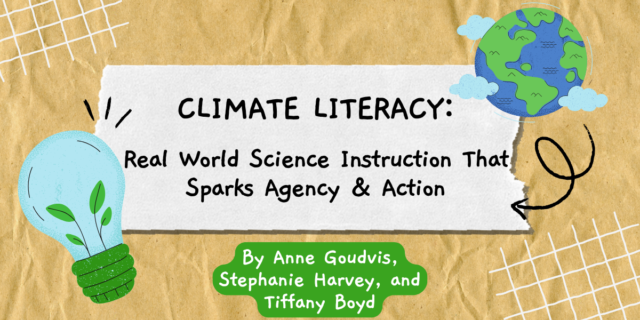
Education is an ever-evolving landscape, and recent Heinemann edWebinars offer a wealth of insights for educators looking to enrich their pedagogy and empower their students. As we launch into 2024, tap into these 11 free on-demand webinars that cover the essential pillars of reading, math, and writing—providing innovative strategies to inspire and rejuvenate your teaching.
Learn from leading educators how to leverage decodable texts to enhance reading fluency, use mindful problem-solving to deepen mathematical understanding, and strengthen students’ writing skills through structured, supportive workshops. This is your opportunity to elevate your instruction and inspire a lifelong passion for learning in every student by promoting confidence and mastery in your classroom.
Reading Webinars
The Power of Decodable Texts: Bring the Science of Reading and Joy to Reading Workshop
Presented by Sarah Mann, Beth Hickey, and Dr. Lucy Calkins
Learn to use decodable books to bring the Science of Reading research—and joy—into your classroom. Decodable texts allow children to apply and practice phonics knowledge precisely as they read. The good news is that you can meanwhile support their deep comprehension, talk, knowledge development, and above all, engagement in reading and sense of personal agency.
When Kids Can’t Read: What We Can Do Now that Makes a Difference
Presented by Kylene Beers
Learn how teachers and literacy coaches can help kids become skilled, engaged, and independent readers. Kylene Beers discusses fix-up strategies that students can use when the text is confusing, vocabulary information that will help teachers understand which words to pre-teach, comprehension strategies that encourage close reading, fluency work that improves reading rate, and engagement strategies that help reluctant readers stick with a text even when the text is tough.
Shared Reading: A Bridge to Independence for Primary to Intermediate Readers
Presented by Chrisie Moritz
During shared reading, you and your students read aloud an enlarged version of an engaging text that provides opportunities for your students to expand their reading competencies. From learning initial concepts of print to navigating complex text structures and crafting techniques, shared reading offers readers across grade levels the opportunity to step up together into more challenging texts.
Content Literacy: Teaching Comprehension Strategies Across the Curriculum
Presented by Stephanie Harvey and Anne Goudvis
We teach comprehension strategies in the literacy block and also across the curriculum in science and social studies so kids can learn, understand, and remember it. Above all, comprehension is a knowledge-building activity. The more content knowledge we have, the more likely we are to grow it. Content literacy is all about how kids acquire knowledge, as well as how they make sense of it and use it in their daily lives.
5 Ways to Improve Reading Comprehension
Presented by Chrisie Moritz
In reading, comprehending refers to the thinking readers do before, during, and after engaging with a text. One of our main goals as teachers is to facilitate active thinking in ways that help our students construct and expand meaning from reading. You’ll explore five instructional moves that can support students with comprehending texts and walk away with practical and specific “tidbits to try” in your classroom.
Math Webinars
Ensure Sensemaking in Math with Mindful Problem Solving for Reflective Inquiry-Based Learning
Presented by Michele Lynch
Learn ways to implement mindful inquiry-based learning that ensures sensemaking in math. See how empowering introspection addresses learning loss in math while building mastery and bringing joy into the classroom. Plus, learn how problem-solving helps establish foundations while encouraging self-directed learning through reflection, resourcefulness, and more.
Elevate Math Instruction with Responsive Approaches for Differentiated Inquiry-Based Learning
Presented by Michele Lynch
Discover how to build mastery and bring joy to the math classroom with active approaches to differentiate inquiry-based learning. Highlights include ways to inspire creative instruction with flexible and informative frameworks. Plus, you learn why implementation transforms schools and makes an impact, from instruction and intervention to assessment and progress monitoring.
Building Math Talk for Sense Making in the Classroom
Presented by Dr. Karen Fuson
Transform from teacher-focused instruction to student-to-student discussion monitored and supported by teachers. Learn how Math Talk enables students from all backgrounds to learn ambitious levels of mathematics with understanding, fluency, and confidence. Dr. Karen Fuson outlines how to build nurturing classrooms that increase understanding with Math Talk communities.
Writing Webinars
Spotlight Phonics and Phonological Awareness in a Joyful, Developmentally Rich Writing Workshop
Presented by Natalie Louis, Kristi Guinness, and Dr. Lucy Calkins
Every minute of your writing workshop can do double duty—supporting both kids’ writing development and their growth as readers. Learn ways you can deliberately support skills such as phonemic awareness, phonics, and the development of sight vocabulary while you meanwhile rally kids to put their lives and their ideas onto the page.
How to Become a Better Writing Teacher
Presented by Carl Anderson and Matt Glover
Discover a path toward becoming a better writing teacher. By taking specific teaching actions aligned with the foundational principles of teaching writing, teachers can improve their day-to-day practice and help students grow as writers. Literacy consultants and authors Carl Anderson and Matt Glover discuss several of these actions, showing videos of them in action with students to bring them to life.
Integrating Reading and Writing: An Alternative Workshop Model
Presented by Ellin Oliver Keene
How can we make the most of precious literacy instruction minutes in the classroom? Learn about innovative and high-impact ways to integrate reading and writing instruction in an alternative form of reading/writing workshop. Hear from long-time author and educator Ellin Oliver Keene to learn how this approach helps to address scheduling challenges, increase classroom engagement, create valuable connections between reading and writing, and more.


